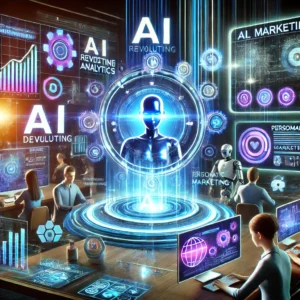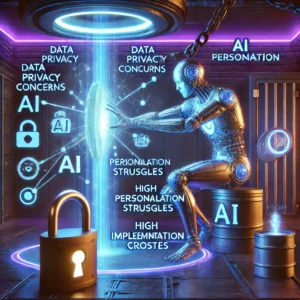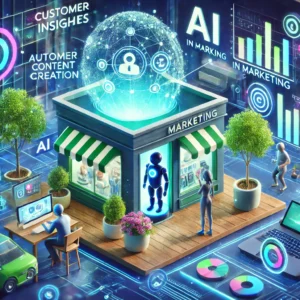Artificial intelligence (AI) is reshaping marketing in ways that were unimaginable a decade ago. From personalized recommendations to predictive analytics, AI is transforming how businesses engage with customers, optimize campaigns, and drive conversions. Marketers who embrace AI gain a competitive edge by making smarter, data-driven decisions.
 How AI is Revolutionizing Marketing
How AI is Revolutionizing Marketing
- Personalization at Scale
Gone are the days of generic marketing messages. AI-driven tools analyze customer behavior, preferences, and past interactions to deliver hyper-personalized experiences. Whether through email campaigns, website content, or product recommendations, AI helps brands speak directly to individual customers.
- Predictive Analytics for Smarter Decisions
AI doesn’t just look at past data—it predicts future trends. Machine learning algorithms analyze vast amounts of customer data to forecast buying patterns, enabling businesses to target the right audience with the right message at the right time.
- Chatbots and Conversational AI
Customer service is evolving with AI-powered chatbots that provide instant responses, resolve issues, and guide users through the sales funnel 24/7. These bots improve customer experience while freeing human agents for more complex interactions.
- Automated Content Creation
AI tools can generate social media posts, email subject lines, and even blog articles based on audience engagement data. While they can’t replace human creativity, they help marketers produce high-quality content more efficiently.
- Ad Optimization and Targeting
AI enhances paid advertising by analyzing user behavior in real time. Platforms like Google Ads and Facebook use AI to adjust bids, target the most relevant users, and optimize ad performance without manual intervention.
Challenges of AI in Marketing

Despite its benefits, AI in marketing isn’t without challenges:
- Data Privacy: AI relies on vast amounts of user data, raising concerns about privacy and compliance with regulations like GDPR.
- Over-Reliance on Automation: While AI can streamline processes, overuse can make marketing
feel impersonal. - Cost and Implementation: Integrating AI tools requires investment in technology and skilled professionals to maximize its potential.
How Startups C
an Benefit from AI in Marketing
For startups, AI can be a game-changer, helping them compete with larger businesses on a smaller budget. Here’s how startups can leverage AI for marketing success:
 Affordable Customer Insights: AI-powered analytics tools allow startups to understand customer behavior without needing a dedicated data team.
Affordable Customer Insights: AI-powered analytics tools allow startups to understand customer behavior without needing a dedicated data team.
- Cost-Effective Advertising: AI-driven ad platforms optimize campaigns to get the most out of limited marketing budgets.
- Automated Customer Support: Chatbots can handle inquiries, improving customer engagement without requiring a large support team.
- Content Generation on a Budget: AI-powered tools help create blog posts, social media content, and email campaigns, reducing the need for expensive content teams.
- Efficient Lead Generation: AI can identify high-potential leads and suggest the best ways to engage them, helping startups grow faster.
The Future of AI in Marketing
AI will continue to evolve, making marketing even more intuitive, automated, and effective. With advancements in natural language processing and sentiment analysis, brands will better understand customer emotions and tailor messaging accordingly. The key for marketers is to balance AI-driven efficiency with human creativity to maintain authenticity.
In a world where attention spans are shrinking, AI offers a powerful way to capture and retain customers. Businesses that leverage AI effectively will not only stay ahead but redefine the future of marketing.
References
- Chaffey, D. (2023). “AI in Marketing: How Artificial Intelligence is Transforming Digital Marketing.” Smart Insights.
- Kotler, P., Keller, K. L. (2022). “Marketing Management.” Pearson Education.
- McKinsey & Company (2023). “The State of AI in Marketing and Its Future Potential.”
- HubSpot (2023). “How AI is Changing Marketing Strategies and Customer Engagement.”
- Google AI Blog (2023). “Advancements in AI-Powered Advertising and Consumer Targeting.
Source: https://business.clsconf.com/

